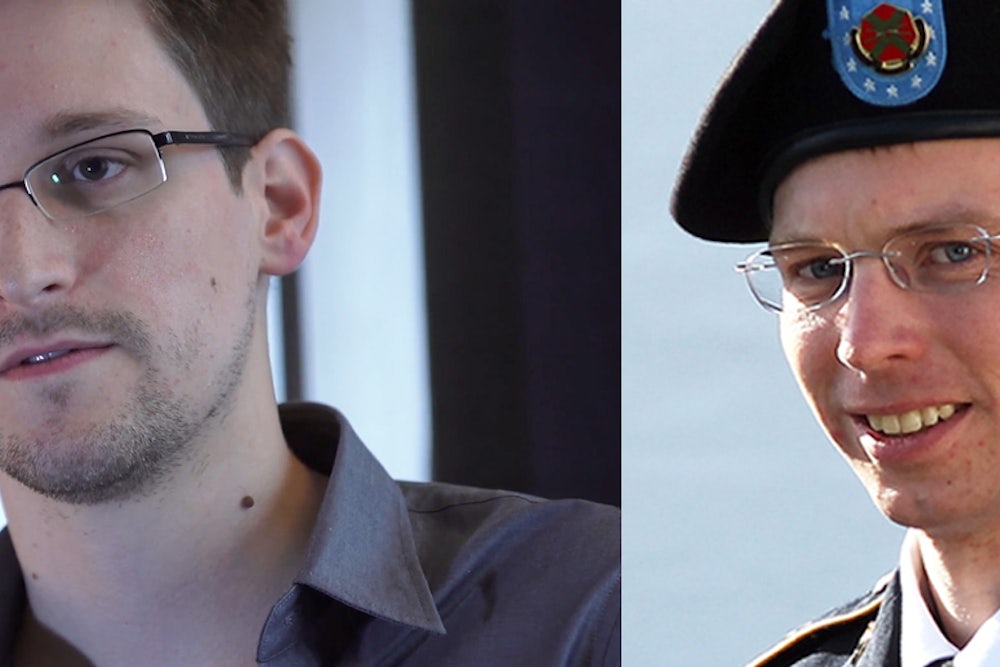For many, the first instinct yesterday upon reading about Edward Snowden, the Guardian and Washington Post’s source on the National Security Agency stories, was to compare him to Bradley Manning, the U.S. Army private currently being court-martialed for disclosing hundreds of thousands of logs, videos, and diplomatic cables, many of them classified, to WikiLeaks. And Talking Points Memo editor-in-chief Joshua Micah Marshall seemed to articulate the bien-pensant liberal’s gut feeling regarding the comparison—certainly he articulated my gut feeling—when he wrote, “Snowden seems to be who Manning’s supporters always wanted to pretend he was but wasn’t.”
To anyone who knows the first thing about Manning and who read Glenn Greenwald’s profile of Snowden yesterday (and watched the accompanying video interview), the differences between the two young men are as obvious as the resonances. Manning had been, according to all accounts, deeply unhappy (among other reasons, he was a gay man in the Don’t Ask, Don’t Tell military) and shy, and had suffered significant setbacks in his career; Snowden appears eloquent and poised, and had been living in Hawaii with his girlfriend making $200,000 a year while doing, according to him, not all that much work as an NSA contractor at Booz Allen Hamilton. Manning leaked to a guerilla outfit run by a pretty obvious megalomaniac, Julian Assange; Snowden leaked to a Constitutional lawyer turned award-winning journalist at The Guardian, which, for all its right-wing critics, is an esteemed, nearly 200-year-old newspaper, as well as to The Washington Post's Barton Gellman, who has won two Pulitzer Prizes.
Most conspicuously, Manning appears not to have discriminated in deciding what to leak, and chose an outlet that was unlikely to discriminate, either. By contrast, Snowden claims he deliberately didn’t leak everything he could have gotten his hands on, and even explicitly contrasted this restraint with Manning’s and Pentagon Papers leaker Daniel Ellsberg’s lack of it. “I carefully evaluated every single document I disclosed to ensure that each was legitimately in the public interest,” he told Greenwald. “There are all sorts of documents that would have made a big impact that I didn’t turn over, because harming people isn’t my goal. Transparency is.” Snowden separately told Gellman, “I don’t desire to enable the Bradley Manning argument that these were released recklessly and unreviewed.”
But if, as Marshall implies, many liberals who fear security-state overreach were nonetheless troubled by Manning, then we ought to reconsider our rosier feelings toward Snowden. For who is he to decide that his release of sensitive information was not “reckless”? He may have had an obscene amount of access for a 29-year-old contractor, but that does not mean he had a bird’s-eye view, nor does that mean he was an expert. And some of his disclosures suggest a man who is self-aggrandizing to the point of, well, recklessness. In his interview with Greenwald, for example, he discloses that he worked for the CIA under diplomatic cover for three years in Geneva, Switzerland. In thus blowing his (defunct) cover, he may have blown the covers of others and put them at risk, much as Manning’s release of the State Department cables may have put others at risk.
On the other hand, if we are inclined to look kindly on Snowden’s leaks because he seems able to justify them well and because he provided us information we are glad to have, then we must revise our view of Manning upward. That Manning was not able to explain himself as articulately as Snowden does not mean the service Manning performed was any less valuable. The operative characteristics of Manning’s and Snowden’s acts were the same: Both men (probably) broke the law to reveal secret information that they believed the public had a right to know. There is ample room for reasonable disagreement over whether such leaks are good or bad, but the respective imperfections of the leaks’ vessels seems a distraction from that discussion.
Meanwhile, the Manning-Snowden comparison’s lesson for the security state, which is reeling from the leaks (“literally gut-wrenching,” Director of National Intelligence James Clapper called them), should be obvious. If you don’t like anyone—from (allegedly) poor, confused Bradley Manning to (seemingly) confident, self-aware Edward Snowden—leaking classified information, the solution is to concentrate that information in as few hands as possible, rather than the 1.4 million people who currently enjoy top-security clearance, and to make sure those hands have a stake in the system—whether because they are democratically elected or are accountable to people who are democratically elected.
Marc Tracy is a staff writer at The New Republic. Follow him on Twitter @marcatracy.
